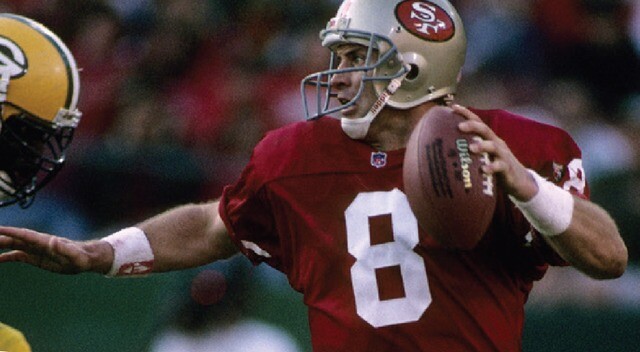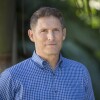In honor of Stephen Covey's 85th birthday, we thought we would celebrate the incredible life this influential author and Latter-day Saint led with the life-changing conversation Covey had with fellow Mormon and former NFL quarterback Steve Young.
Steve Young never backs down from a challenge. In fact, his tenacity is the hallmark of his football career and every other aspect of his life. From tirelessly perfecting his game to earning a law degree from BYU while in the NFL (which even required him to attend class the day after his 1994 Super Bowl victory) to enduring years of criticism while he searched for “the one” to marry, Young has never hesitated to do the work required to achieve his goals.
In his new autobiography, QB: My Life Behind the Spiral, Young gives fascinating insights into his dynamic football career, as well as deeply personal, never-before-told stories from his life. We at LDS Living are privileged to share an exclusive glimpse of Young’s new book with our readers. Enjoy!
► You'll also like: The Surprising Reason Steve Young Didn't Serve a Mission
PARADIGM SHIFT
While thrilled to be a part of the San Francisco 49ers, serving as back up to Joe Montana—one of the greatest quarterbacks in history—took its toll on Young. With very little playing time the first few years, Young finally got his chance to lead the 49ers when Montana injured his elbow in the 1990 NFC Championship Game and was forced to miss the entire 1991 season. But it was a rocky start for Young. Midway through the season, the 49ers found themselves struggling with an unimpressive 4–4 record.
Discouraged by the situation, Young flew to Utah for a quick break. Little did he know that his flight back to San Francisco would be life changing. He writes:
My seat assignment was next to business guru [and fellow Latter-day Saint] Stephen Covey. His classic best-seller, The 7 Habits of Highly Effective People, was on my bookshelf. I had read it when it first came out.
We struck up a conversation, and it immediately turned to football. I started telling him about my situation: For four years I had played behind the greatest quarterback in NFL history. He got hurt, and I finally had a chance to start. In my eight starts we went 4–4. I would have to remind guys that Joe had actually lost a game before. He threw incompletions, even an interception or two. But it was no use saying this stuff. The idea of Joe leading a team to a 4–4 record was inconceivable. The bottom line was that the comparisons to Joe were driving me crazy. Nothing I did was good enough. Joe had won four Super Bowls. I was in an impossible situation.
I felt like a whiner venting all of this. But Covey was patient.
“Now, Joe’s still on the team, right?” he asked.
“Yeah,” I said. “That’s part of the problem.”
“I understand,” he said. “But you get to ask him questions, right? In other words, he’ll mentor you?”
“Well, yeah,” I said.
“And the 49ers are one of the better organizations in football?”
“The gold standard,” I said.
“And Mike Holmgren, your coach from BYU, is one of the best, right?”
“Best quarterback coach in the league,” I said.
He paused for a moment. “I think you may be looking at your situation the wrong way,” he said.
“What do you mean?”
He explained that he traveled the world in search of organizations that created opportunities for employees to become the best. “I gotta be honest with you, Steve,” he said. “I don’t know that I’ve seen an organization better than this one.”
I was intrigued.
“If I understand your situation with the 49ers correctly,” he continued, “you are in the one place in the NFL where you can find out just how good you can get.”
Now he really had my attention.
“And few people in the world get to find out how good they are at one thing,” he said. “They are stuck somewhere in life where they don’t have the opportunity or the platform to find out.”
I had never looked at it like that. And I had completely lost track of time as I considered what he was saying. The plane touched down in San Francisco, and we were about to get off.
“So here’s the question,” he said. “Do you want to find out how good you can get?”
“Yeah, I do.”
“I mean, some people are just afraid to find out,” he said.
“No. I absolutely want to find out.”
“Then go do it,” he said. “Good luck.”
I’m a big Star Wars fan, and this was a Yoda moment. My axis had just flipped. I was searching for a new perspective, and I had found it in my chance encounter with Covey. It was divine intervention that forced me to rethink my situation in a completely different paradigm.
I have a quest, I told myself. My quest is to find out how good I can become.
It’s not about comparisons or outside expectations.
It wasn’t going to be easy. But I couldn’t wait to get back on the field.
Despite his optimistic new perspective, however, the season got even harder for Young when he sustained a knee injury, giving fellow quarterback Steve Bono a chance to shine as starting quarterback. It wasn’t until Bono was injured that Young was allowed to play again in the 15th game of the season.
The 1992 season was also rough for Young, and at one point it seemed his job was in serious jeopardy. Ultimately, however, he was instrumental in helping the team achieve an impressive 14-2 record. That year he also received the NFL Most Valuable Player Award.
In the spring of 1993, at Montana’s request, San Francisco traded Montana to the Kansas City Chiefs. Young was now the 49ers’ undisputed starter and would remain so for the rest of his career. In 1994, Young led his team to victory in Super Bowl XXIX, where he scored a record-breaking six touchdowns (surpassing the previous Super Bowl record set by Joe Montana). He was also named Super Bowl MVP.
Adapted from QB: My Life Behind the Spiral, by Steve Young, with Jeff Benedict.
Lead image from Associated Press
Read more about Steve Young in the September/October issue of LDS Living Magazine, available at Deseret Book. This edition also features stories about Studio C, the Church in Fiji, and an interview with New York Times best-selling author Jeff Benedict.


